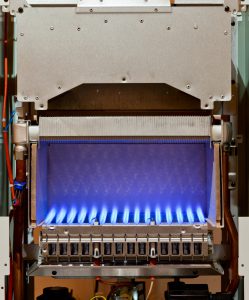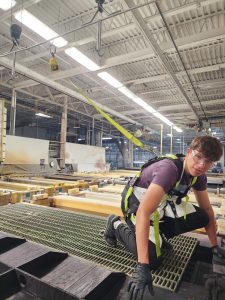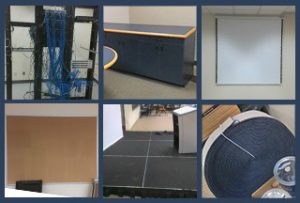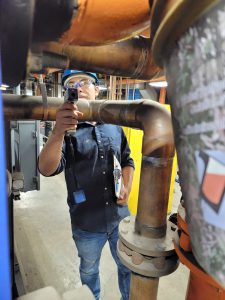January 2024
Inside the Newsletter:
Intern Application | P2 Boiler | Metal | Nonin Success
Apply NOW for Your 2024 MnTAP Intern
In case you didn’t know, the application window closes on January 31st for the 2024 MnTAP Intern Program. Don’t miss your opportunity to add an extra person to resolve those stubborn waste, water or energy utilization challenges in your facility that you just have no time to tackle. Do you have a project idea, but are not sure if the focus or timing is right? MnTAP staff can help you evaluate this after your proposal submission!
DON’T WAIT – Apply for a 2024 MnTAP Intern TODAY!
The MnTAP Intern Program pairs manufacturing, food processing, hospitality, and other facilities in Minnesota with a college student who researches and recommends water conservation, energy efficiency and pollution prevention solutions. MnTAP interns have helped identify opportunities that save participating companies millions of dollars annually.
If your company could use another set of eyes to achieve similar results, please apply now or give us a call! We anticipate supporting 15-18 projects that could focus on water conservation, energy efficiency, sustainable chemistry, solid waste, and pollution prevention.
Proposals will be accepted through January 31st and companies will be contacted by MnTAP technical staff within two weeks of submission for additional project development and scoping. If you are interested in the program, but feel that our proposal deadline of January 31st does not leave enough time, please contact Matt Domski by phone or email below.
For more information about the intern program or the application process, visit the MnTAP Intern Program webpages for Businesses. Use this Apply link to access the Intern Company Proposal form.
For More Information, Contact
Matt Domski – Intern Program Manager
612-624-5119
mdomski@umn.edu
New Pollution Prevention Advanced Boiler Tune-ups Project
 MnTAP and Center for Energy and Environment (CEE) are launching a project to improve air quality by reducing particulate matter less than 2.5 microns (PM2.5) and nitrogen oxides (NOx) in communities with environmental justice concerns. Air pollution is estimated to play a role in 10% of all deaths in the Twin Cities metro area¹ with the highest estimated rates of air pollution-related death and disease found in neighborhoods with the largest percentage of Black, Indigenous and People of Color (BIPOC), low-income and uninsured residents, and people who live with a disability.
MnTAP and Center for Energy and Environment (CEE) are launching a project to improve air quality by reducing particulate matter less than 2.5 microns (PM2.5) and nitrogen oxides (NOx) in communities with environmental justice concerns. Air pollution is estimated to play a role in 10% of all deaths in the Twin Cities metro area¹ with the highest estimated rates of air pollution-related death and disease found in neighborhoods with the largest percentage of Black, Indigenous and People of Color (BIPOC), low-income and uninsured residents, and people who live with a disability.
The project will leverage advanced boiler tune-up methodology developed by CEE to provide technical assistance to approximately 20 Minnesota businesses in environmental justice areas to increase boiler efficiency which will save energy and reduce costs and emissions. Additionally, the project will develop and share a toolkit for incorporating pollution prevention (P2) activities within existing community programs.
For More Information, Contact
Laura Sevcik – Associate Engineer
612-624-8192
lsevcik@umn.edu
Funding for this project comes from a U.S. EPA Pollution Prevention Grant: Environmental Justice in Communities in a partnership between MnTAP, MPCA, CEE, and the Lake Street Council.
The Once and Future Savings
 MnTAP has recently wrapped up a three year project funded by MPCA and EPA dedicated to identifying and spreading Best Management Practices (BMPs) in the metal fabrication and metal finishing industries. 18 Minnesota manufacturers (mainly machine shops and electroplaters) were interviewed about which environmental practices help their businesses be both sustainable and competitive. The facilities interviewed were primarily job shops of various sizes from different locations around the state. An in-depth summary of MnTAP’s findings can be found on the project page.
MnTAP has recently wrapped up a three year project funded by MPCA and EPA dedicated to identifying and spreading Best Management Practices (BMPs) in the metal fabrication and metal finishing industries. 18 Minnesota manufacturers (mainly machine shops and electroplaters) were interviewed about which environmental practices help their businesses be both sustainable and competitive. The facilities interviewed were primarily job shops of various sizes from different locations around the state. An in-depth summary of MnTAP’s findings can be found on the project page.
Common areas of opportunity were:
- Recycling coolant
- Reducing dragout
- Conserving water
- Optimizing water softeners
- Decreasing solid waste generation
- Improving energy efficiency
After learning about these successful strategies, the MnTAP team worked with 12 different companies to identify opportunities to implement relevant BMPs. This work resulted in recommended savings of 120,000 lb of hazardous waste, 1,000 MTCO2e, 24,000,000 gallons of water, and $950,000 annually.
Since the conclusion of the project, MnTAP has continued to work with and receive assistance requests from metal finishers. The team hopes to spread knowledge of BMPs and increase savings for even more Minnesota businesses in the future.
For More Information, Contact
Gabrielle Martin CEM – Associate Engineer
gamartin@umn.edu
Funding for this project comes from The Minnesota Pollution Control Agency Pollution Prevention Grant In Performance Partnership Grant PPG BG-98568811 and EPA.
Reuse Success Story: Nonin Medical
 Nonin Medical is a medical device manufacturer located in Plymouth. MnTAP was approached by the company in early November to help on various topics, one of which was waste. After a site visit was conducted, it was clear there was ample opportunity to help Nonin divert numerous materials housed in one of its buildings that was closing down. MnTAP had until December 31, so the time crunch was on.
Nonin Medical is a medical device manufacturer located in Plymouth. MnTAP was approached by the company in early November to help on various topics, one of which was waste. After a site visit was conducted, it was clear there was ample opportunity to help Nonin divert numerous materials housed in one of its buildings that was closing down. MnTAP had until December 31, so the time crunch was on.
The first step was to catalog the items spanning multiple categories of furniture with pictures. These pictures and a writeup were distributed via the Minnesota Materials Exchange (MME) newsletter. Then came outreach to large organizations that deal in some of these spaces of used furniture and office equipment, as well as other nonprofits. It’s often easier to move items to larger organizations because less logistical management is needed between entities. However, once certain organizations stated they were or weren’t interested, MnTAP’s waste specialist started reaching out to numerous professional networks who could amplify and spread the message to their own professional and personal networks. An announcement made its way via Facebook through one of the networks, and suddenly, more people started coming forward. These included an individual looking for items for his university fraternity, an individual belonging to Reuse MN wanting items for their home, a private contractor who works in office furniture, and several members of a church. The reuse community is large and diverse, and tapping into the right platforms can be a fruitful and revealing endeavor.
Ultimately, an estimated 7,000 – 10,000 lb. of materials were successfully diverted and kept out of a landfill. Items included rolling office task chairs, conference desks and tables, dry-erase boards, cork/tack boards, technology server racks, projectors, filing cabinets, work desks, and stationary chairs. The items were free, but people had to personally coordinate their transport to get the items and have space for them. This undertaking with Nonin spurred discussions of reuse policy for companies and how governments and associations can be more proactive like Nonin to encourage reuse. Many times, organizations accept landfilling as the status quo and the “cost of doing business.” Certainly, reuse as an alternative has many benefits, which include environmental (new materials don’t need to be bought if items are salvaged), economic (free items for recipient and zero hauling costs for company), and social (jobs are supported through reuse and moving these items). Community also gets built and other business opportunities emerge from these reuse interactions.
A big shout out to William Knudson from Nonin Medical for all of his hard work and identifying his own sources for these items. William was able to successfully find homes for wall coverings, tile, bulbs, a refrigerator, a dais, and metal racks, as well as other items. He cared deeply about this project and was incredibly responsive for the two months of technical assistance. Emails continued up until New Year’s Eve to ensure everything was taken care of. It was a pleasure getting to engage on a meaningful project like this with him.
If your company is interested in reuse or having our waste specialist come onsite to look at excess items, please see contact information below.
For More Information, Contact:
Jon Schroeder, LEED AP – Sustainable Materials Management Specialist & Minnesota Materials Exchange Administrator 612-624-4645
jschro@umn.edu
[1] https://www.pca.state.mn.us/air-water-land-climate/life-and-breath-report
